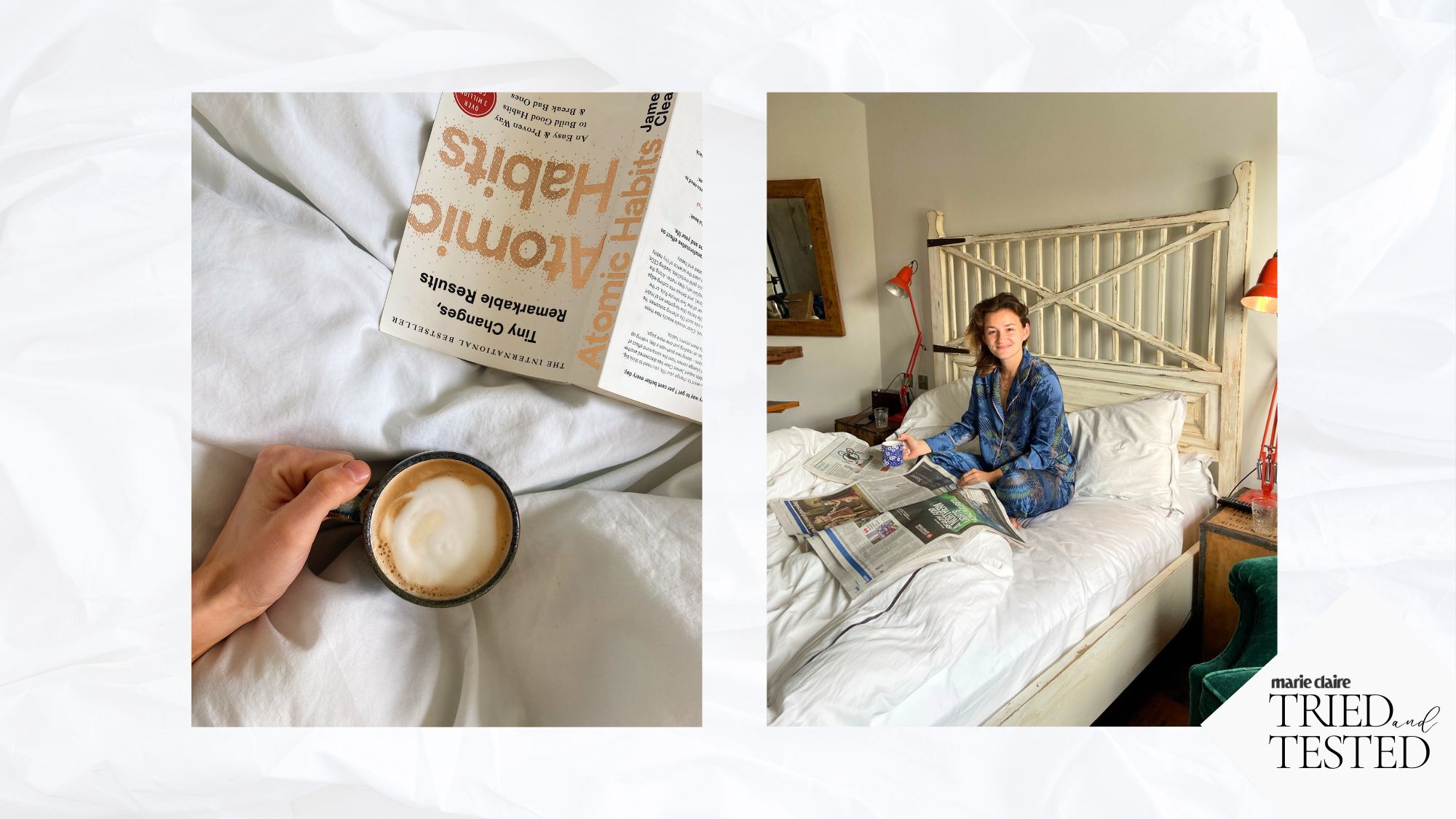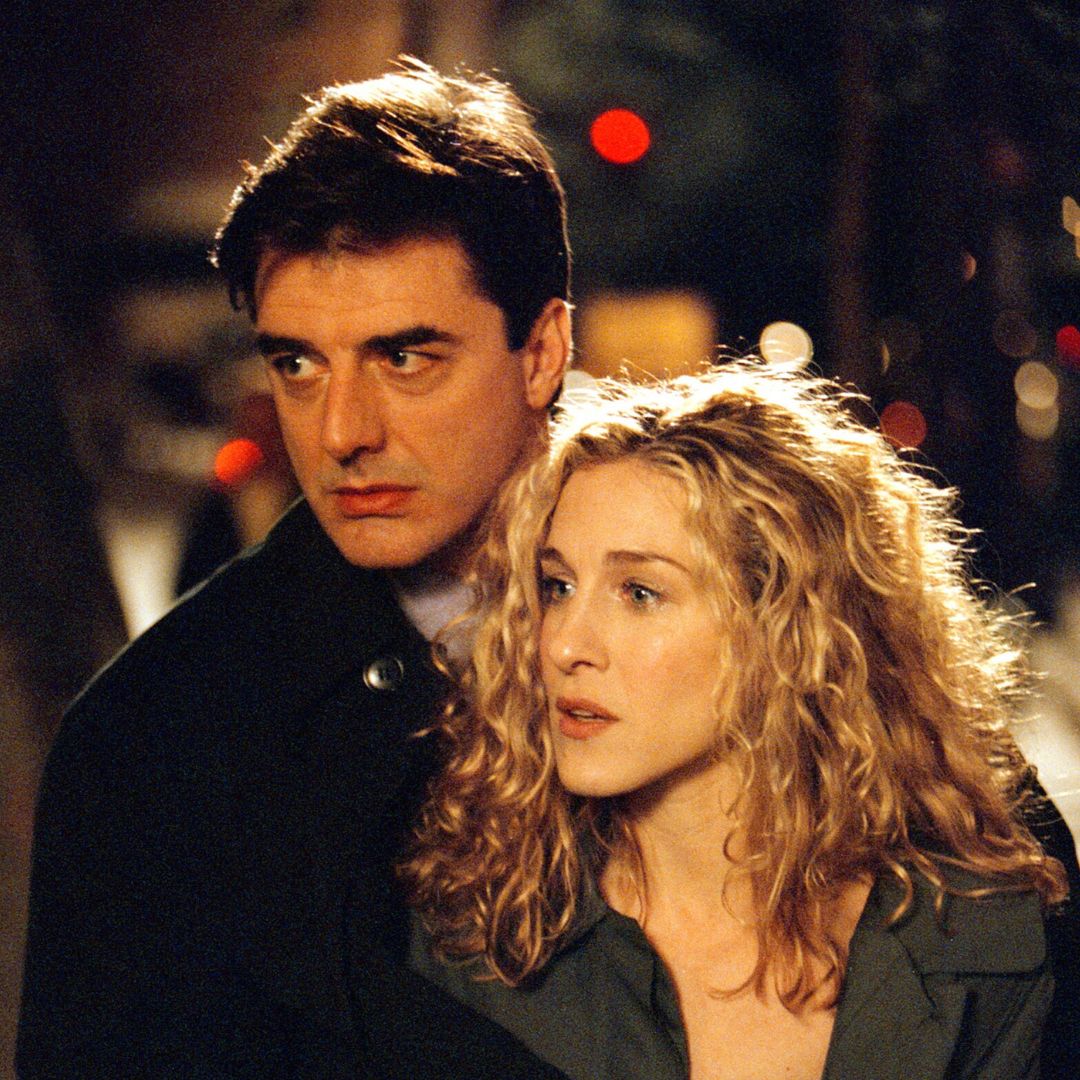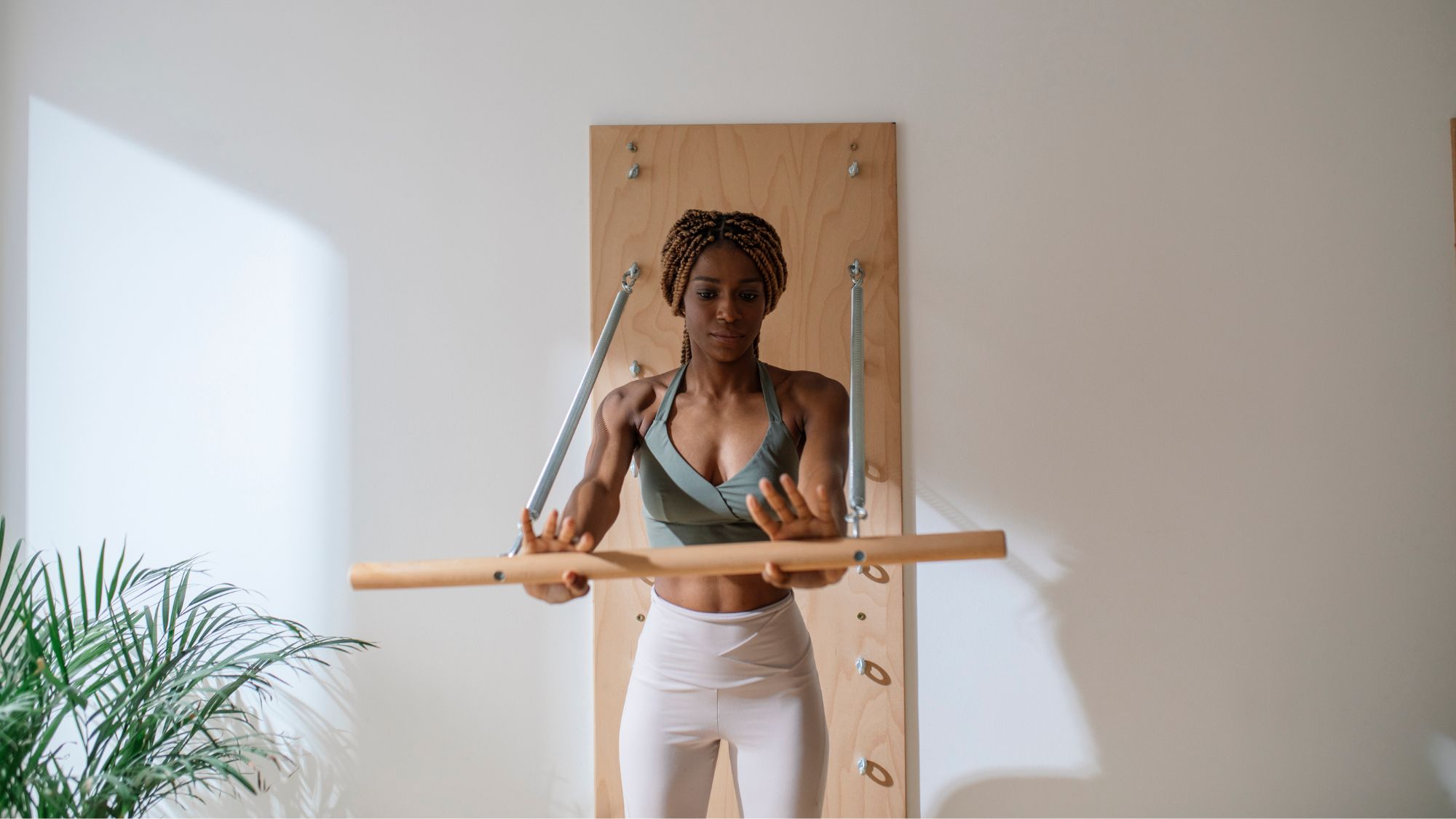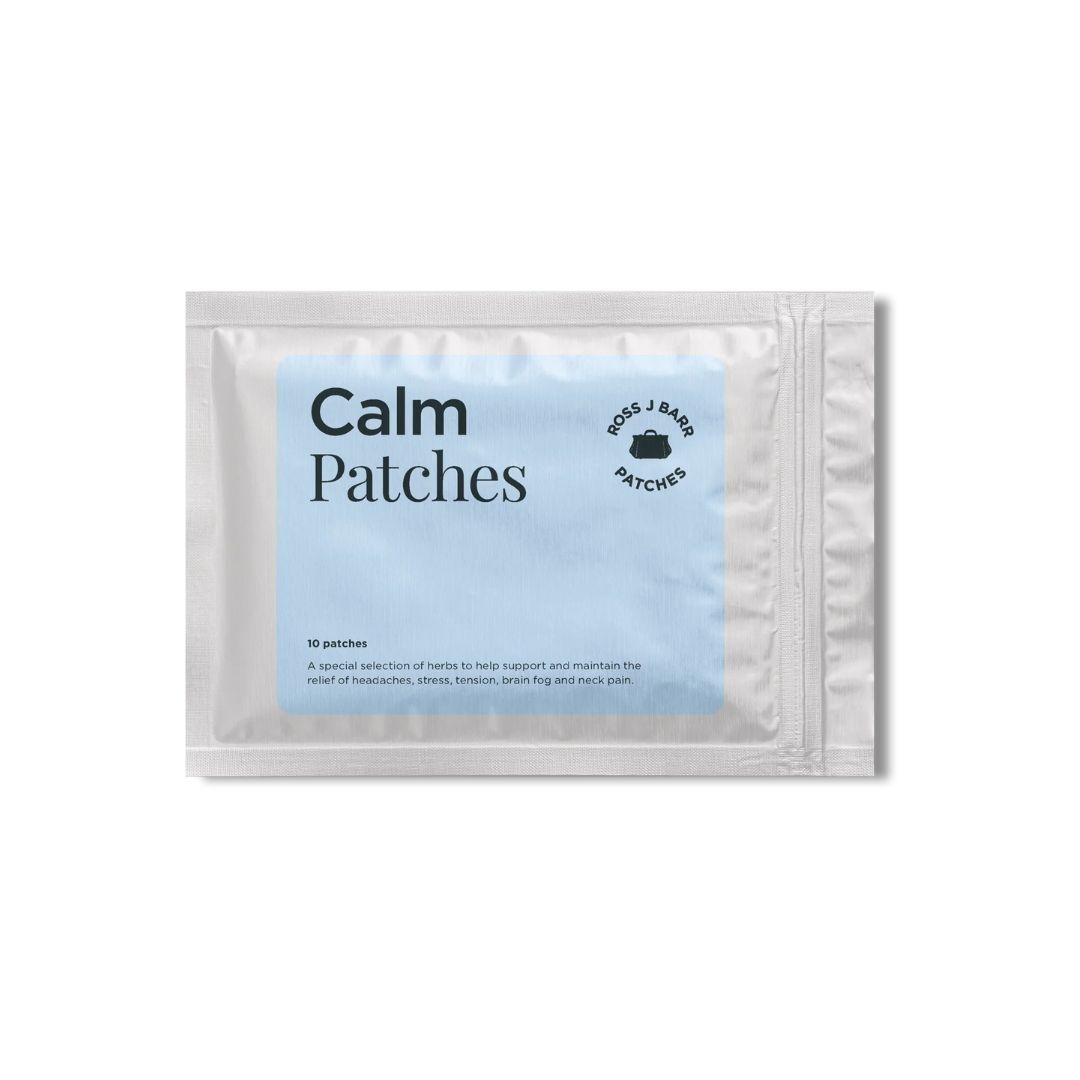I used to feel constantly tired - but sleeping with my phone outside my room for 9 months has transformed my energy
Trust me on this one.

Despite being Health Editor here at Marie Claire UK, come the end of last year, I was tired - like reaching burnout, struggling to get out of bed kind of bone tired. I prided myself on healthy living in most areas of my life - hitting my daily protein target, exercising regularly, and practising mindfulness in times of stress. Yet, come 10.30 pm, I'd plug my phone in next to my bed and end up replying to emails, writing to-do lists, and doom-scrolling for hours on end.
My wind-down routine left a lot to be desired. When you picture someone who works in the wellness industry, you probably imagine evening meditations, camomile tea and - most importantly - a strict no-tech-in-the-bedroom rule. But as a busy working Editor, I often found it difficult to switch off, working late into the night from my tiny screen.
To say this knocked on to my day-to-day wellbeing would be an understatement. The more tired I became, the more irritable I was and the more sugar my body craved - I lacked energy, after all, so relied too much on quick-fix energy providers that I normally enjoy in moderation, like caffeine and sugar.
I'm not alone - a YouGov study last year found that one in eight UK adults feel tired all the time. According to the NHS, tiredness can impact everything from your energy and concentration levels, to your memory, to your decision-making. Naturally, it can impact your emotions, too, leaving you frustrated and feeling like you're running on empty.
So, come January, I made a vow to plug my phone in to charge in the hallway, rather than next to my bed. Would I sleep through my alarm every morning? Would the work to-do's pile up uncontrollably? Or would I simply sleep more energised and be able to tackle my day-to-day with a clear mind? (Spoiler alert: it was the latter). Keep scrolling to find out why. Don't miss our guides to how to improve sleep and insomnia treatments, while you're here.
I was constantly tired - until I started sleeping with my phone outside of my bedroom
Months one to three
First up: a bit of background for you. I've long known that I'm the type of person who needs at least eight hours of sleep a night. I function better, am more productive, and can generally get more done if I've banked my eight hours.
That said, thanks to my late-night phone habit, some nights I was getting anything from six to seven hours sleep. Even on nights when I did get my full eight hours, I still felt exhausted, as scrolling on my phone just before bed meant the quality of my sleep wasn't great (more on this, later).
Marie Claire Newsletter
Celebrity news, beauty, fashion advice, and fascinating features, delivered straight to your inbox!
So, I made the move, choosing to plug my charger in in the hallway and rely on my sunrise alarm clock to wake me up every morning. My biggest worry was that said sunrise alarm clock wouldn't wake me up, but I've never had an issue with it and find the gentle, sunrise-mimicking light leaves me feeling far fresher first thing.
Speaking to sleep scientist and circadian rhythm expert Dr Kat Lederle during this time, she confirms that use of any screen late at night means your body continues to be alert, with the light exposure pushing back the natural timing of your body clock, making it harder to fall asleep. "Not just that, but light exposure can cause less deep sleep, meaning even if you do get a good amount of sleep, you may not feel well rested."
For the first few weeks, I still found myself crouching next to my phone in the hallway to schedule a few last minute emails or have one final scroll of Instagram. I noticed that I was checking my apps almost impulsively but reminding myself to be mindful of my phone usage helped here (as did having it physically out of arms reach, so I couldn't be tempted in moments of weakness).
Come months two and three, I was getting used to not having my phone constantly glued to my hand and enjoyed the fact that our bedroom felt like a little sleep haven, complete with glowing Lumie lamp, my favourite Sunday of London sleep spray and a pile of books to be read. Weekend mornings were blissfully relaxing, and the no-phone-in-the-bedroom not only left me feeling more energised but meant I spent more time actually talking to my partner rather than ignoring him in favour of a funny Instagram meme.
Months four to six
Month four was when I noticed the biggest difference in how I felt. I felt alert each morning, could focus at work, and didn't feel foggy and exhausted come 4pm.
I'd been wearing a Whoop fitness tracker for this period and could see my "readiness" score (read: sleep quality combined with a few other things) getting higher and higher each week. One thing I found interesting - whenever I checked my phone in the hallway and exposed myself to the harsh screen light for even a few minutes before bed in the first few months, I'd see a direct correlation to my score the next day. I'd wake up several times throughout the night and spend far less time in deep sleep, highlighting why I'd been feeling so exhausted despite sometimes being in bed for eight to nine hours.
I also began to read up on my cortisol levels during this time, another thing that could be impacting your sleep quality. As someone with PCOS, I know my cortisol levels are higher than the average person's so focused on low intensity exercise, mindful drinking and monitoring my stress levels to keep them in check and further improve my sleep quality.
How does cortisol impact your sleep, you ask? As sleep psychologist Dr Katherine Hall explained to me: "Among many other functions, cortisol controls your sleep-wake cycle. Before the existence of artificial light, our sleep-wake cycle was regulated by the sun setting and rising. However, as more and more of you bring electronic devices into the bedroom - which produces artificial light - your melatonin levels can be hindered as that light can signal to the body to stop the production of your sleep hormone. With that process out of sync, cortisol levels in the morning can be affected - meaning you are less likely to feel alert in the morning.”
Her advice? Reduce your exposure to bright light at least two hours before your bedtime (and yes, this includes the TV, too). She also recommends keeping the time you go to bed and the time you wake up the same, where possible, which I now aim to do every day.
Shop MC UK's go-to sleep aids

NEOM's Perfect Night's Sleep Pillow Mist is one of my favourites. Formulated with a calming blend of lavender, sweet basil and jasmine essential oils, it's one of the easiest ways I've found to switch off and wind down.
Months six to nine
During this time, I also spoke to Dr Hall about what exactly it is that makes phone screens so damaging to sleep quality. "The blue light emitted by phone screens can have a profound impact on your circadian rhythm, often known as your internal body clock," she explains. "This light interferes with the production of melatonin, the hormone responsible for regulating your sleep-wake cycles, as exposure to blue light in the evening or during nighttime awakenings signals to the brain that it's still daytime, suppressing melatonin production."
In turn, this disruption to your circadian rhythm can lead to difficulties falling asleep and reduced sleep quality, ultimately affecting your energy levels the next day. And it doesn't just physically impact you: from a psychological perspective, your phone is often a source of notifications, work-related emails, and social media content, Dr Lederle continues. "A typical phone’s light exposure is around 40 lx - and it's not just the light that can keep you awake but the content and the dopamine hit, too."
I'm far enough removed from my late night scrolling by month nine to see how damaging it had been to my health for the past few years. Sure, it doesn't feel like it's having that much of an impact at the time, and it's all too easy to write it off as a non-negotiable (you've got to respond to that email, right?). But two things I've learnt? It can always wait until tomorrow, and planning ahead more (read: not at 10pm the night before) not only helps me feel calmer, but helps me sleep better, too, resulting in more energy and an all-round better mood.
Of course, there are still times when I have to go on my phone before bed or simply want to sit in bed with a cup of tea and check social media. Wellness isn't about hard and fast rules, it's about working out which lifestyle works for you and running with it (80/20, and all that). Need more convincing on this one? It's totally free, making it just about the cheapest wellness hack you'll likely ever hear of. Why not give it a go?
How do phone screens impact our sleep?
According to sleep scientist and circadian rhythm specialist Dr Kat Lederle, by looking at your phone or laptop, you are effectively putting a mini-sun in front of your eyes. "This will affect the secretion of melatonin, which is typically released a few hours before you go to sleep as the sun sets," she shares. "Evening light exposure, and particularly exposure to light from your phone, will suppress melatonin secretion, and your body clock needs melatonin to tell the rest of the body it is night-time."
So, without it, there is no such message, meaning the body continues to be alert. Can it impact our sleep? Without doubt, the expert confirms. "Not just that, but the changes in sleep are likely to affect how you feel during the day, too, especially your mood."

Ally Head is Marie Claire UK's Senior Health and Sustainability Editor, nine-time marathoner, and Boston Qualifying runner. Day-to-day, she heads up all strategy for her pillars, working across commissioning, features, and e-commerce, reporting on the latest health updates, writing the must-read wellness content, and rounding up the genuinely sustainable and squat-proof gym leggings worth *adding to basket*. She also spearheads the brand's annual Women in Sport covers, interviewing and shooting the likes of Mary Earps, Millie Bright, Daryll Neita, and Lavaia Nielsen. She's won a BSME for her sustainability work, regularly hosts panels and presents for events like the Sustainability Awards, and is a stickler for a strong stat, too, seeing over nine million total impressions on the January 2023 Wellness Issue she oversaw. Follow Ally on Instagram for more or get in touch.
-
 Sources have opened up about Timothée Chalamet and Kylie Jenner's "intense" start to the year
Sources have opened up about Timothée Chalamet and Kylie Jenner's "intense" start to the yearBy Jenny Proudfoot
-
 Two Hollywood actresses were offered the role of Carrie Bradshaw before Sarah Jessica Parker
Two Hollywood actresses were offered the role of Carrie Bradshaw before Sarah Jessica ParkerBy Jenny Proudfoot
-
 Stop what you're doing: these are, hands down, the best wall Pilates workouts for the core, according to top instructors
Stop what you're doing: these are, hands down, the best wall Pilates workouts for the core, according to top instructorsRigs at the ready.
By Katie Sims

